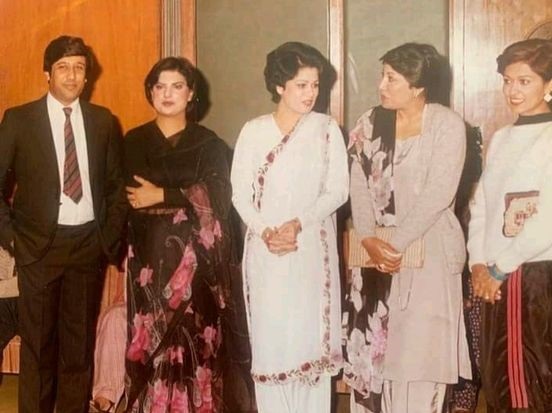Written by: Haroon Shuaib
Posted on: March 30, 2021 |  | 中文
| 中文
Kanwal Naseer Celebrating 14th August
On 26 November 1964, in a makeshift studio attached to Radio Pakistan Lahore, the first ever transmission of Pakistan Television was aired. Tariq Aziz, an established broadcaster who later became a household name for hosting the trendsetting game show Neelam Ghar (Auction House), was ready to face camera. Alongside him was a nervous 18-year-old Kanwal Hameed, known after her marriage as Kanwal Naseer, who would go on to become the first face of television in Pakistan. On 25 March 2021, Kanwal Naseer breathed her last after a brief illness. With her demise, ended an era of grace and poised articulation in Pakistan.
Kanwal’s mother, Mohini Hameed, was the first female radio announcer of the country and a famous drama artist. “From the age of perhaps seven, I was placed in front of the mic to be the voice of a princess in almost every radio story aired for children. We were a family of modest means but the wealth of culture and intellectuality was in abundance,” Kanwal Naseer shared in an interview.
As the mother spent hours at the radio station, incidentally a stone’s throw away from their home, Kanwal grew up with big names of music, literature and broadcasting. Safdar Mir, A. Hameed, Feroz Nizami, Faiz Ahmed Faiz, Sultan Khoosat, Rafi Peer, Imtiaz Ali Taj, and Sufi Tabassum were like extended family for her. Singers such as Mehdi Hassan Khan, Noor Jehan, Surraya Multanikar, and Farida Khannum were frequenters at the radio station where Kanwal, still in her teens, was soon hosting shows, reading English news, and taking part in radio dramas. With a voice more mature than her years, she picked up techniques of voice modulation so well that in a drama she played the role of an elder sister to a character played by her own mother. “Those were simple times. Big names like Bano Qudsia and Ishfaq sahib would take a bus to the radio station, and young ladies such as actor and broadcaster Yasmin Imtiaz and poet Shabnam Shakeel would come on bicycles. I was in my first year of college when television started, and without realizing that it was perhaps the biggest moment in history of media in Pakistan, I became a part of it,” Kanwal reminisced.
Even after getting married at a tender age, Kanwal stayed connected with broadcasting and television for the rest of her life. With mentors like Aslam Azhar, first Managing Director of Pakistan Television, and Fazal Kamal, revered as the founder of television drama, Kanwal also acted in a few plays, but her heart was not in acting. Her control over breath and throw of voice, her decorum, elegance and exuberant personality made her the perfect choice for compering. The radio shows she hosted in English for nine years, and her landmark TV shows such as Khawateen Time (Ladies Time), Mehfil-e-Shab (Night Sessions), and Raat Chali Hay Jhoom Kay (The Night Passes by) are unrivalled because of her commentary. She was the first choice for compering at important events such as First Women’s Conference, South Asian Federation (SAF) Games, and First Overseas Convention. Besides many presidential and prime ministerial events, she also represented Pakistan across the globe, including in China, South Korea, Germany, and England.

PTV News Anchors of Yesteryears (L to R) Khalid Hameed, Mahpara Safdar, Arjumand Shaheen, Kanwal Naseer and Meena Pervez
Prominent TV compere and broadcaster Tauseeq Haider, who incidentally also interviewed her recently for television, remembers her as the most down-to-earth and positive person. ‘During the worst droughts, I had the opportunity to travel with her across Pakistan, all the way from Gilgit, Skardu, Hyderabad to Karachi. It was a series of fund raising events that Radio Pakistan had planned from all its stations, and Kanwal and I co-hosted them. The cause resonated so much with her that, despite her celebrity-status, she didn’t flinch for a moment. We did the whole tour by road. Every day we were in a new town and every evening we did a show. Her commitment, her love for the people of the country, her positivity, and her hearty laugh is what I will miss the most.”
Qurat-ul-Ain Ali Rizvi, a seasoned broadcaster and television compere, recollects, “I was doing a show for radio that she had previously done for years. She came to the studio and I obviously felt nervous at seeing her. Afterwards, she complimented me generously and recommended that I do more shows. Her sense of style was always on-point. I met her recently, and she lovingly reprimanded me for favoring flat shoes instead of heels. She was always immaculately dressed and wore high heels.”
As the TV producer for many shows that Kanwal compered, Khwaja Najam-ul-Hassan, who was also presenting a weekly radio show with her on FM 98.4 recalls, “A week before she passed away, we were co-hosting a music program titled, Puranay Suhanay (Old and Gold). She always brought an infectious energy to the studio. She added so much with her photographic memory and beautiful intonation.”
Mazhar Nisar first met Kanwal at Broadcasting House in Islamabad in 1999. The two hosted a show together every evening for the next 8 years. “She was a role model as a broadcaster, in her kindness, generosity and unconditional love for those around her. A gentle and loving soul, she developed a personal bond with everyone, a bond that lasted till she breathed her last,” he said. Pakistan’s radio and television will definitely be poorer without the unmistakable charm of Kanwal Naseer who will always be missed.
You may also like: